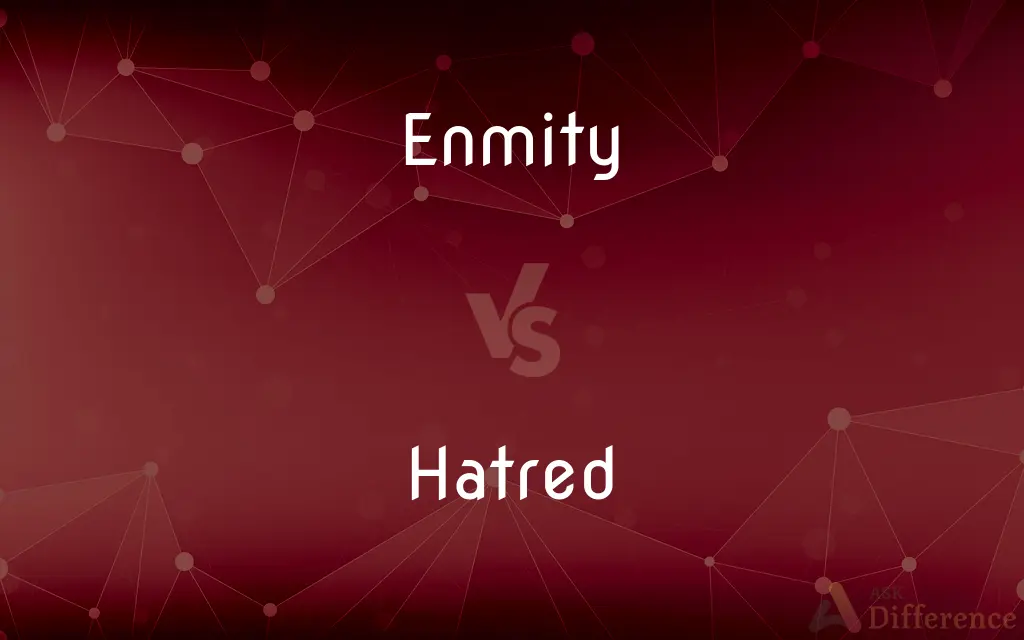Enmity vs. Hatred — What's the Difference?
By Tayyaba Rehman — Published on November 16, 2023
Enmity refers to a mutual hostility or opposition between groups or individuals, while hatred is an intense personal dislike or loathing.

Difference Between Enmity and Hatred
Table of Contents
ADVERTISEMENT
Key Differences
Enmity, when broken down, captures the essence of mutual animosity or opposition, often present between groups or individuals. It suggests a deep-seated antagonism that might arise from rivalry, differences in beliefs, or other conflicts. Hatred, on the other hand, denotes an intense emotional aversion or loathing. It is a personal sentiment, which can be one-sided and isn't necessarily reciprocated.
While enmity frequently suggests a longstanding feud or discord, often having roots in historical, cultural, or social divides, hatred is a raw, intense emotion that can arise quickly. Hatred can be momentary or sustained, while enmity often implies a consistent opposition over time.
Enmity might not always be fueled by intense feelings of hatred; it could be a result of competing interests or territorial disputes. Conversely, hatred can exist without any established enmity; one might harbor hatred based on personal experiences, biases, or unfounded fears.
The usage of the terms also varies contextually. Enmity is often used in contexts that highlight rivalries or conflicts, be they between nations, groups, or individuals. Hatred, due to its deeply emotional connotation, is more often associated with personal feelings and reactions.
Comparison Chart
Nature
Mutual antagonism or opposition
Intense personal dislike or loathing
ADVERTISEMENT
Reciprocity
Often mutual between groups or individuals
Can be one-sided
Duration
Implies longstanding discord
Can be momentary or sustained
Cause
Can be due to rivalry, beliefs, territorial disputes
Arises from personal experiences or biases
Usage
Highlights rivalries or conflicts
Associated with personal feelings and reactions
Compare with Definitions
Enmity
Mutual hostility or opposition between parties.
The enmity between the two families dated back generations.
Hatred
An intense feeling of aversion or loathing.
His hatred for injustice drove him to activism.
Enmity
A consistent opposition over time.
Their enmity arose from business disputes and never settled.
Hatred
A personal sentiment, often not based on mutual feelings.
The celebrity faced undue hatred from many online trolls.
Enmity
Deep-seated antagonism, often due to conflict or rivalry.
The political enmity between the two nations was palpable.
Hatred
Deep-seated resentment or animosity.
He felt a sudden rush of hatred toward his betrayer.
Enmity
A sentiment stemming from past conflicts or differences.
His actions during the game created enmity among team members.
Hatred
A passionate emotion of repugnance.
Their once strong bond had now turned to hatred.
Enmity
A state of being enemies or adversaries.
Old wars had sown seeds of enmity among the tribes.
Hatred
A strong emotional dislike toward someone or something.
Her actions were motivated by pure hatred.
Enmity
Deep-seated, often mutual hatred.
Hatred
Intense animosity or hostility.
Enmity
A feeling or state of hatred or animosity
"More than almost any public man I have ever met, he has avoided exciting personal enmities" (Theodore Roosevelt).
Hatred
Strong aversion; intense dislike.
Enmity
The quality of being an enemy; hostile or unfriendly disposition.
Hatred
Strong aversion; intense dislike; hate; an affection of the mind awakened by something regarded as evil.
Enmity
A state or feeling of opposition, hostility, hatred or animosity.
Hatred
The emotion of hate; a feeling of dislike so strong that it demands action
Enmity
The quality of being an enemy; hostile or unfriendly disposition.
No ground of enmity between us known.
Enmity
A state of opposition; hostility.
The friendship of the world is enmity with God.
Enmity
A state of deep-seated ill-will
Enmity
The feeling of a hostile person;
He could no longer contain his hostility
Common Curiosities
Is enmity more common between groups or individuals?
Enmity can exist both between groups and individuals, often due to rivalry or conflicts.
Can one feel hatred without any established enmity?
Yes, hatred can arise from personal experiences or biases without an established enmity.
Which term implies a longer duration, enmity or hatred?
Enmity often suggests a longstanding discord, whereas hatred can be momentary or prolonged.
Is enmity always based on mutual feelings?
Enmity typically suggests mutual antagonism or opposition between parties.
Are enmity and animosity the same?
While similar, enmity often implies mutual antagonism, while animosity can be a general hostility or aversion.
Can hatred be momentary?
Yes, hatred can be a fleeting emotion or a sustained sentiment.
Can business competitions lead to enmity?
Yes, competing interests in business can lead to enmity between parties.
Does enmity always imply a deep-seated hatred?
No, enmity might arise from rivalry or disputes, not necessarily from deep-seated hatred.
Is hatred always reciprocated?
No, hatred can be one-sided and isn't necessarily reciprocated.
Can hatred be based on unfounded fears?
Yes, hatred can arise from unfounded fears, biases, or misconceptions.
Does enmity always arise from historical events?
Not always, though historical events can be a cause, enmity can also arise from present-day conflicts or differences.
Can countries have enmity toward each other?
Yes, countries can have enmity due to historical conflicts, territorial disputes, or differing ideologies.
Is it correct to say that hatred is a more intense form of dislike?
Yes, hatred represents a deeper and more intense form of dislike or aversion.
Share Your Discovery

Previous Comparison
Alpha Keratin vs. Beta Keratin
Next Comparison
Have Been vs. Has BeenAuthor Spotlight
Written by
Tayyaba RehmanTayyaba Rehman is a distinguished writer, currently serving as a primary contributor to askdifference.com. As a researcher in semantics and etymology, Tayyaba's passion for the complexity of languages and their distinctions has found a perfect home on the platform. Tayyaba delves into the intricacies of language, distinguishing between commonly confused words and phrases, thereby providing clarity for readers worldwide.













































